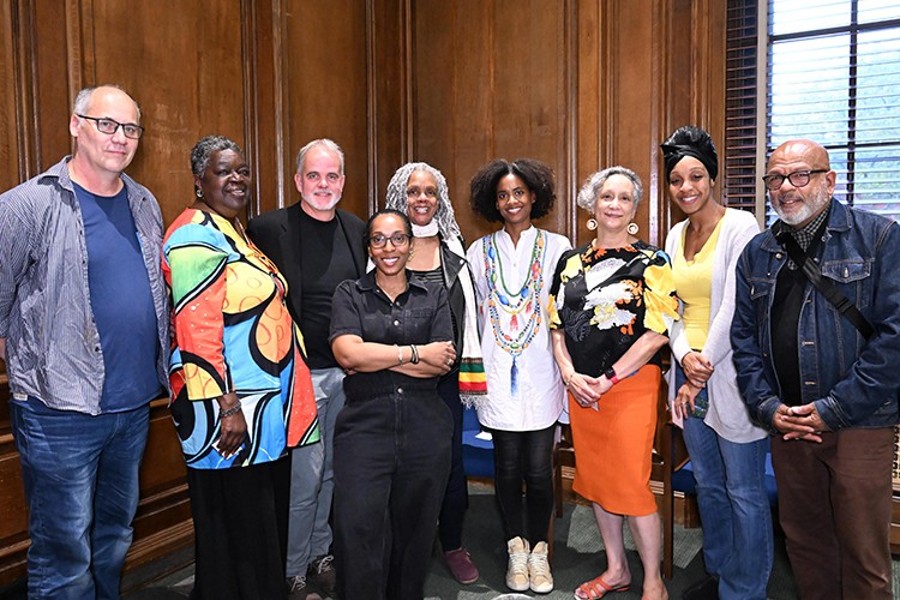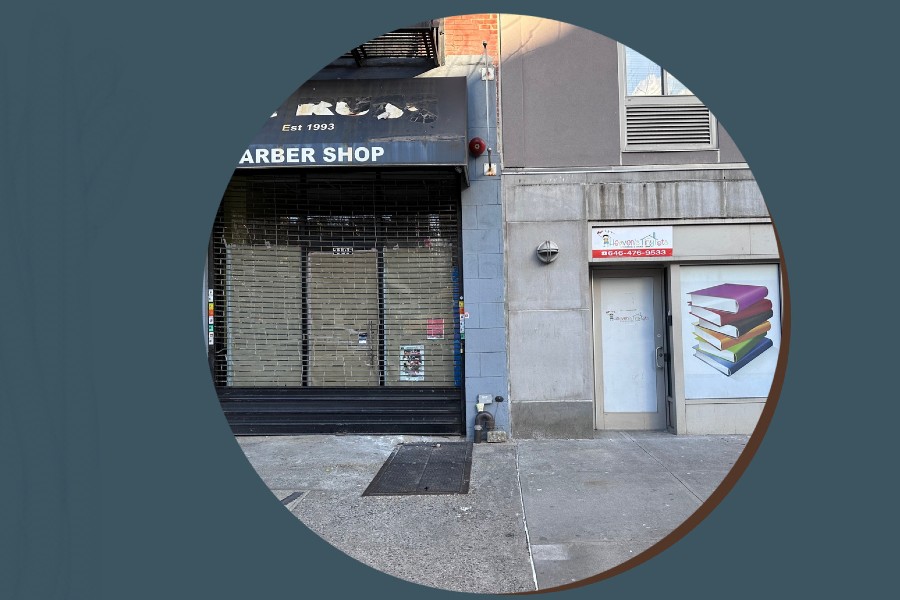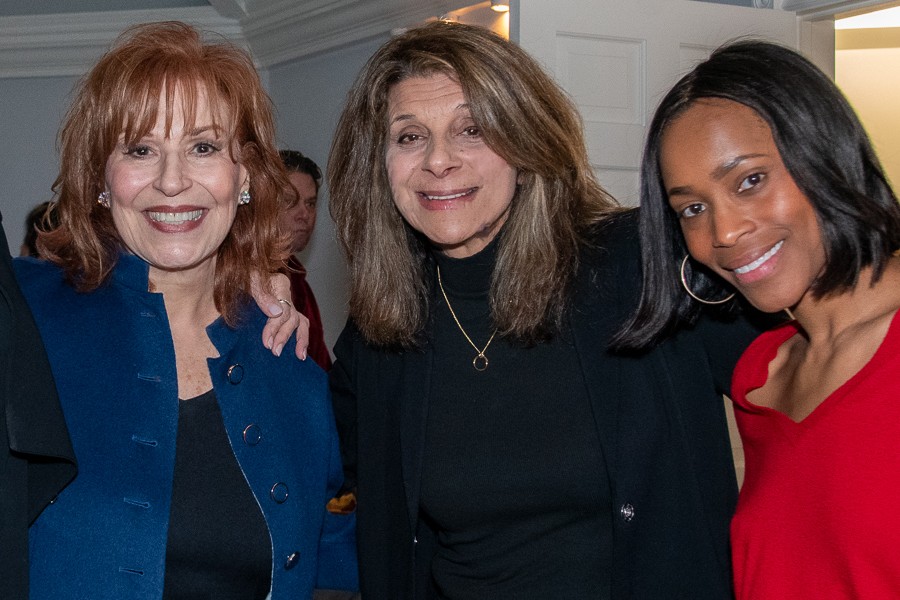 The Senate Democratic Majority today advanced legislation empowering more New Yorkers to take advantage of early voting opportunities and exercise their Constitutional right to vote. These bills build on the historic voting reforms passed under the Senate Democratic Majority during the 2019 Legislative Session. This new package of voting reforms includes Automatic Voter Registration that will cut costs while improving voter participation and improvements to early voting to ensure adequate polling locations in communities throughout the state.
The Senate Democratic Majority today advanced legislation empowering more New Yorkers to take advantage of early voting opportunities and exercise their Constitutional right to vote. These bills build on the historic voting reforms passed under the Senate Democratic Majority during the 2019 Legislative Session. This new package of voting reforms includes Automatic Voter Registration that will cut costs while improving voter participation and improvements to early voting to ensure adequate polling locations in communities throughout the state.
“Voting is the bedrock of democracy. We must do more to help eligible New Yorkers participate in the political process and have their voices heard,” Senate Majority Leader Andrea Stewart-Cousins said. “These bills build on the voting reforms we passed first thing last session, and will empower more New Yorkers to register to vote and utilize early voting opportunities.”
The additional voting reforms passed by the Senate Democratic Majority includes:
- Automatic Voter Registration (AVR): This bill, S.6457B, sponsored by Deputy Majority Leader Michael Gianaris, creates a system of automatic voter registration (AVR) within designated agency applications at the Departments of Health and Motor Vehicles.
- College or University Provided Polling Place: This bill, S.4378, sponsored by Senator Kevin Parker, provides that election districts shall not be drawn partly on or off a college campus. It also requires a polling location on the grounds of the college or university when there are 300 registered voters or more on the campus.
- Ensuring Access to Early Voting for New York’s Population Centers: This bill, S.6754A, sponsored by Senator Neil Breslin requires that in each county, the municipality with the largest population contain at least one early voting location.
- Voter Notifications: This bill, S.6805, sponsored by Senator Zellnor Myrie authorizes state and local transportation departments to provide important voting registration and Election Day information on message signs on highways.
- Early Voting on Long Island: This bill, S.6922, sponsored by Senator Anna Kaplan will require that each town and city on Long Island have at least one early voting polling location.
- High Population Early Voting Polls: This bill, S.6923A, sponsored by Senator Monica Martinez will require New York’s largest cities and towns to have at least one early voting polling site per 50 thousand registered voters.
- Accessible Early Voting: This bill, S.6925, Sponsored by Senator Alessandra Biaggi will require all medium-sized towns and cities to have at least one early voting polling location.
- Mobile Early Voting Locations: This bill, S.6926A, sponsored by Senator Rachel May will increase opportunities for early voting by providing counties, at local option, with the authority to allow early voting at portable polling locations.
- Exempting Schools From Early Voting Locations: This bill, S.6930 sponsored by Senator Liz Krueger will exempt school buildings from being used as early polling sites
Senate Elections Committee Chair and bill sponsor Senator Zellnor Myrie, said, “This legislation is a no-brainer. With a simple change, we can use the signs we already have on our roads and highways to raise awareness about voter registration deadlines and upcoming elections to boost turnout in New York. Low cost, high reward. If our state is to go from worst to first in voter participation, we should use every tool at our disposal, and that’s what this bill does.”
Bill Sponsor Senator Alessandra Biaggi, said, “Last year we expanded voter accessibility in New York State by enacting ten days of early voting prior to Election Day. While the majority of medium-sized towns and cities across New York State had their own early voting site during the 2019 election cycle, the municipalities that could not meet the 50,000 voter threshold did not. This poses difficulty for voters to access early voting polling sites due to extended travel time to neighboring counties and issues with public transportation. The purpose of this bill is to protect equitable voter accessibility by ensuring that every medium-sized town and city has at least one early voting site, further encouraging more New Yorkers to be civically engaged.”
Bill Sponsor Senator Neil Breslin, said, “In 2019, the State Legislature took historic steps to making New York’s voting process easier and more accessible. This legislation builds upon those reforms by making sure that in each county the largest municipality contains at least one early voting poling location. Additionally, this legislation will require that every effort be made to locate a polling site on a public transportation route to ensure greater accessibility. Improving voter access is critical to the early voting effort and this legislation will ensure more people have better access to early voting locations.”
Bill Sponsor Senator Anna Kaplan, said, “The historic enactment of early voting in New York has already gone a long way towards making voting easier for New Yorkers across the state, but there is still more to be done to make early voting convenient and accessible to all Long Islanders. This bill will ensure that every town and city on Long Island has at least one early voting location, so that everyone has an opportunity to have their voice heard at the voting booth.”
Bill Sponsor Senator Liz Krueger, said, “Early voting has broadened access to the ballot box for many New Yorkers who were struggling to get off of work, find childcare, or overcome other hurdles to voting on a single day. But like any new statewide program, there have been some growing pains. By exempting schools from use as early voting locations, though still allowing them to be used on Election Day itself, we will avoid disrupting the work of our students while still guaranteeing access for people who want or need to vote early.”
Bill Sponsor Senator Monica Martinez, said, “This legislation will ensure we are making voting accessible for everyone. With the introduction of early voting, we need to adequately serve all those who want to participate in this process. Voting poll sites in New York will increase in highly populated cities per 50 thousand registered voters.”
Bill Sponsor Senator Rachel May, said, “Over the last year, I have heard from many election officials on the need for greater flexibility in placing early voting locations. Across the country, states have innovated models for creating portable and temporary early voting locations. I am proud to bring one of these models to New York. By offering the opportunity to open short-term polling locations, in addition to regular polling places, more voters will be able to access early voting — especially elderly, rural, and low-income voters.”
Bill Sponsor Senator Kevin Parker, said, “It is our duty as elected officials to ensure that all New Yorkers have the ability to exercise their right to vote, and making it easier for eligible voters is the right thing to do. The legislation that I sponsor, Senate Bill S.4378, will ensure that there are designated polling places on college campuses with a population of 300 or more registered New York State voters. The legislation passed today builds upon the historic progress made by the new Senate Democratic Majority to reform our electoral system and restore the public’s trust in our government.”
Senate Majority Conference Chair Senator José Serrano said, “Last year we made history by implementing early voting and changing antiquated voting laws that disenfranchised countless New Yorkers. Today’s actions continue to modernize voter registration, improve access to polling sites, and make it easier for New Yorkers to vote for government representatives that reflect their values and needs.”
Senator Joseph P. Addabbo, Jr. said, “This package of important reforms will improve New York’s existing early voting law by making pre-Election Day voting opportunities much more available and accessible to citizens throughout the state. In addition, the proposals seek to increase overall voter participation and voter accessibility in our democracy: very worthy goals given our state’s abysmally low turnout at the polls during most elections.”
Senator Jamaal Bailey said, “The expansion of voting accessibility and voter registration is vital to encourage civic engagement. I am proud to be a part of a conference that prioritizes mobilizing voters and easing the process to vote. After last year’s historic voting reforms, I am glad that we are continuing to pass meaningful legislation and expanding early voting.”
Senator John Brooks said, “When it comes to voting reforms, in 2019 we were able to accomplish much for residents of New York regarding increased access to our most fundamental of democratic institutions. However, there is more work to be done and we are committed to expanding that access with this slate of legislation in the new session.”
Senator David Carlucci said, “The Senate Majority is working to make sure every New Yorker’s voice is heard. Done, are the days where you could not go and vote early. New York is modernizing our election laws and making the challenges of voting a thing of the past.”
Senator Leroy Comrie said, “As promised, the Senate Majority Conference is not resting on its laurels when it comes to improving our electoral system. These bills build upon the successes of last year’s monumental reforms by further expanding access to early voting and Election Day polling sites in communities throughout our state, among other critical reforms. I am proud to stand with Leader Andrea Stewart Cousins and my colleagues as we continue the fight for a fairer New York for all voters.”
Senator Jim Gaughran said, “This package of voting reforms builds on and improves the historic voting reforms we passed last session. These bills will ensure voting is easier and more accessible than ever. In particular, I am proud to support legislation to close the disparities in early voting locations that we experienced this past election year, such as in my hometown of Huntington, to ensure early voting sites are equitably placed across the county, as well as legislation exempting school districts from being used as an early voting site.”
Senator Andrew Gounardes said, “It is fitting that we open this session as we began last year’s: With laws to strengthen civic participation and increase access to the vote. These laws will build on last year’s progress to reverse New York’s abysmal record on voter registration and turnout. Engagement is vital for the health of civic institutions and our democracy. I am proud to continue our work to translate the principle of one person, one vote into policy action.”
Senator Brad Hoylman said, “Until 2018, New York consistently ranked as one of the states with the lowest voter turnout in the nation. Thanks to the historic reforms passed by the new Senate Majority, led by Majority Leader Stewart-Cousins, hundreds of thousands of New Yorkers were able to utilize early voting in 2019. I’m proud to join my colleagues in the Senate today to pass Automatic Voter Registration and other vital reforms that will expand voting rights and protect our democracy.”
Harlem’s Senator Robert Jackson said, “I am thrilled to support these pieces of legislation with my vote. Automatic Voter Registration will bring New York into a new era of access to the ballot box. The early voting measures will strengthen the reforms we passed last year by implementing lessons we learned from the 2019 early vote in October and November. Ahead of the 2020 elections, these reforms further Democracy in Action!”
Senator Todd Kaminsky said, “Voting is a fundamental right and one that should be easily accessible and open to all New Yorkers. Adding to last year’s reforms, we’re taking additional aggressive measures that will make voting in elections easier.”
Senator Brian Kavanagh said, “For a second year, we’re starting off the session by addressing one of our most basic obligations, to facilitate participation in free and fair elections. Automatic voter registration will help ensure that more New Yorkers can get registered to vote and keep their registration up to date. The college campus voting bill will address the fact that elections have sometimes been administered in ways that make it more difficult to vote. And we’re following through on the promising start of early voting last year, but improving access. I applaud Leader Andrea Stewart-Cousins, Elections Committee Chair Zellnor Myrie, and the bill sponsors for advancing all these important measures right out of the gate in the 2020 session.”
Senator Tim Kennedy said, “For years, New Yorkers have been hampered by arcane election laws that hindered voter participation rather than encouraged it. When the Democratic Conference took the Majority, that changed. I’m proud to join my colleagues in continuing to make voting reforms a top priority, and pleased to help advance an agenda that makes it more accessible for people to exercise their rights as Americans.”
Senator John Liu said, “Voting is everyone’s civic duty, and today we expand upon the progress we made last year in making voting easier and more accessible for New Yorkers. These common sense reforms will allow voters to readily exercise this fundamental freedom and participate in our democracy.”
Senator Monica Martinez said, “This legislation will ensure we are making voting accessible for everyone. With the introduction of early voting, we need to adequately serve all those who want to participate in this process. Voting poll sites in New York will increase in highly populated cities per 50 thousand registered voters. These sites need to be accessible via public transportation to allow those who rely on our mass transit services to participate in the electoral process.”
Senator Shelley B. Mayer said, “I am pleased that on our first week back, we are continuing the work of one of the most consequential accomplishments of the previous Legislative Session–our historic voting rights reforms. With these new laws, we make it easier for people to register to vote through Automatic Voter Registration and ensure convenient placement of General Election & Early Voting polling sites to make it easier for people to make their voices heard.”
Senator Jen Metzger said, “The package of voting reforms adopted today builds on last year’s legislative accomplishments to expand voter participation in New York and make it easier for our citizens to exercise this most fundamental democratic right. As the Senator representing schools including SUNY New Paltz, SUNY Delhi, and SUNY community colleges in Orange, Ulster, and Sullivan counties, I am especially pleased to support legislation that will empower college students to be able to vote on campus. I hope and expect we will see a significant and much welcomed increase in young voters as a result.”
Senator Jessica Ramos said, “Last year, we worked tirelessly to protect New Yorkers’ right to vote and today we continue that work by passing automatic voter registration and other measures to increase participation in our democratic system. The cost of expanding early voting across New York is nothing compared to the value of strengthening our democracy and I commend Leader Andrea Stewart-Cousins, Elections Committee Chair Zellnor Myrie, and all my colleagues for making this a priority this session.”
Senator Gustavo Rivera said, “Adding to the historic voting reforms we passed last year, this new legislative package will continue to strengthen our State’s electoral system by providing New Yorkers the resources they need to better navigate and actively participate in our electoral process. This package demonstrates that the Majority Conference is truly invested in empowering New Yorkers to exercise their right to vote and encourage their civic participation.”
Senator James Sanders Jr. said, “It is our duty and our responsibility as Americans to make our voices heard. We have the power to effect change, but we lose that power when we don’t exercise our right to vote. By enacting these reforms, it is my hope that more New Yorkers will sign up to take part in the Democratic process.”
Senator Luis R. Sepulveda said, “The passage of additional voting measures is important for improving our democracy and creating the immediate change we need to expand voting rights and empower more New Yorkers, especially historically marginalized communities. We are tearing down barriers that threaten the rights of voters and making it that much easier and accessible for New Yorkers to vote. This can transform the course of elections and history. I commend my colleagues in the Senate, who have taken on these voting reforms that will change New York State for the better.”
Senator Kevin Thomas said, “The health of our democracy depends on a voting system that is fair and accessible. Last year, I was proud to join my colleagues in bringing historic voting reforms to New York, including early voting. This year, we will continue to protect the rights of all New Yorkers and ensure an accessible, equitable, and accountable voting process.”
Susan Lerner, Executive Director of Common Cause/NY, said, “By starting the 2020 legislative session with a package of voting reforms, the State Senate sends a strong message regarding their commitment to voting rights and strengthening our democracy. Automatic voter registration (AVR) will streamline the way eligible New Yorkers register to vote, while providing adequate safeguards to protect the most vulnerable populations. By placing poll sites on college campus, young people will be encouraged to vote. Now the Assembly must follow the Senate’s lead and pass these crucial reforms immediately. We can’t wait, it’s time to let New York vote!”
Sean Morales-Doyle, Senior Counsel in the Voting Rights and Elections Program at the Brennan Center for Justice, said, “We are thrilled that the New York Senate is making democracy a priority again in 2020. Automatic voter registration in particular is a transformative reform that has proven effective in adding voters to the rolls across the country. We eagerly await action from the Assembly and the Governor to make it law.”
AVR Now founder Sean McElwee, said, “I can’t think of a better way for the state Senate to start off this session than by approving automatic voter registration legislation. New York’s long-standing barriers to registration leave 4 million eligible New Yorkers unregistered, one of the lowest registration rates in the country. AVR would rectify this problem using modern technology to safely and efficiently register eligible people to vote. I want to thank Deputy Majority Leader Mike Gianaris for championing this legislation and look forward to seeing it signed into law.”
Juan Rosa, Northeast Director of Civic Engagement for National Association of Latino Elected and Appointed Officials (NALEO) Educational Fund, said, “NALEO Educational Fund congratulates the New York State Senate on making it easier for New Yorkers to register to vote. By making strides to ensure the right to vote is more accessible to one the nation’s largest statewide Latino eligible voter population and all voters, New York is demonstrating principled commitment to broad participation in democracy.”
Kristen Zebrowski Stavisky, Democratic Commissioner of Elections, Rockland County, said, “After a historic year of reforms including the first election with early voting, the Democratic Caucus of the New York State Election Commissioners Association is proud to stand with the Senate Majority as they continue to work for the people of NY. The 2020 Election Bill package, most notably automatic voter registration, helps ensure unfettered access for all eligible voters. Together, we are building a stronger, more representative, and responsive democracy.”
Wennie Chin, Senior Manager of Civic Engagement with the New York Immigration Coalition, said, “Streamlining and modernizing New York’s burdensome voter registration process is essential to elevating and amplifying the voices of every New Yorker across the state. Senator Mike Gianaris’ automatic voter registration (AVR) bill will help close the registration gap ensuring that the 1.1 million individuals who are eligible to vote but unregistered can have a renewed opportunity to participate in our elections. The New York Immigration Coalition thanks Senator Gianaris and the other sponsors of the AVR legislation, which will pull New York’s electoral system into the 21st century.”
Jennifer Wilson, Deputy Director, League of Women Voters of New York State, said, “2020 will be a landmark year for voting in New York State. Voters were thrilled to have the opportunity to vote early in 2019 and will now know that when they show up to vote, early or on Election Day, they will already be registered and ready to cast their ballot. This package of voting reforms will make voting more accessible to college students, voters with limited transportation options, and voters living in both urban and rural communities. We thank the Senate Majority for leading the charge in passing this slate of voting reforms and hope that the Assembly will pass these reforms quickly so they can be implemented before the June primary.”
Blair Horner, Executive Director, NYPIRG, said, “Last year, New York took the first big steps toward expanding opportunities to vote and modernizing the way it runs its elections. Today’s Senate reform package includes important measures that will continue to move the state towards having the best nation’s best voter registration and voter participation laws. We applaud action on these next steps and urge that the Assembly and Governor join in making New York the national example for how best to run elections.”
Betsy Gotbaum, Executive Director of Citizens Union, said, “Last year, New York saw a number of crucial pro-democracy reforms become law and we are pleased to see that work continue in 2020 with the passing of Automatic Voter Registration in the Senate, today. This law will allow more voters to participate in the electoral process. In states where this reform has been implemented, voting rolls have become more accurate, and states have saved money. With some of the lowest voter turnout numbers in the country, New York must take all possible steps to make voting more accessible.”
Amy Torres, Director of Policy & Advocacy at the Chinese-American Planning Council (CPC), said, “Historically, New York’s antiquated election laws barred low-income voters, voters of color, and newly naturalized voters from exercising their rights and ultimately, from accessing power. Asian Americans and Pacific Islanders are eligible to register to vote at higher rates that many other naturalized groups — but a lack of language access, tailored resources, and direct outreach prevent many would-be voters from fully participating in our democracy. Last year, the legislature closed a historic wave of voting reforms with a promise to pass Automatic Voter Registration at the start of session. Today’s package of voting bills demonstrates that New York is not yet finished passing bold, progressive reforms that unlock political potential for people across the state.”
Follow on Twitter at http://www.twitter.com/NYSenDems
Become a Harlem Insider!
By submitting this form, you are consenting to receive marketing emails from: Harlem World Magazine, 2521 1/2 west 42nd street, Los Angeles, CA, 90008, https://www.harlemworldmagazine.com. You can revoke your consent to receive emails at any time by using the SafeUnsubscribe® link, found at the bottom of every email. Emails are serviced by Constant Contact








